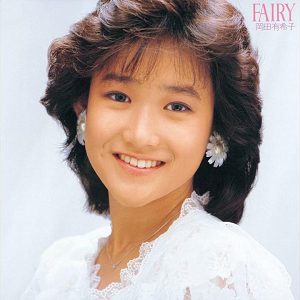
|
All songs arranged by Masataka Matsutouya |
FairyLP, Cassette, CD: 1985-03-21 UHQCD: 2015-09-16 Bonus Tracks (2015 Release): Private Red |
Review:
There’s plenty to like about Fairy, but this is probably the weakest of Yukiko’s four albums. In many ways, this album is a companion to Cinderella, sporting a very similar title and a very similar concept. Like Cinderella, there is a balance between the mundane and the fantastical, teenage love and forest fairies. It’s a formula that worked for Cinderalla, and I don’t think this album is wrong to try and repeat it. The real problem is the songwriting quality, which just isn’t as strong as the previous album. Fairy lacks the energy and freshness of Cinderella, and the absence of Mariya Takeuchi is sorely noted. There aren’t any songs I truly dislike, but there aren’t all too many stand-outs either. Too much of this album feels like filler or worse, like it could’ve been sung by any idol.
Of course, there’s still plenty of good songs on the album. This album marks the first appearance of Tetsurou Kashibuchi, and his album closer Pop Up Lycéenne is one of the highlights. Kashibuchi seems to like stretching Yukiko to sing at a higher pitch than normal, something he’d take to the extreme in Love Fair. Other highlights include fan-favourite Anata wo Wasureru Mahou ga Areba, a lovely, sad song of heartbreak with lyrics by Chinfa Kan (who is one of my favourite lyricists) and Me wo Samashite Darling, a very distinctively Kouji Makaino track with a fun melody. The dramatic piano sounds in the verses are delightful.
Although the album is called ‘Fairy,’ only a few tracks really lean into this concept, and while Cinderella was faithful to the theme of ‘teenage love,’ the themes of Fairy are less solidly defined. In some ways, this is to the album’s benefit, as it lends itself to more variety in its songs (I can’t imagine Cinderella having a song like Lady Joker, for instance,) but it makes the album unfocused. Like the album that came before, and the ones that came after, I’d have liked this album to take more risks, including more compositions from smaller, more avant-garde composers (like Cinderella did with Mioko Yamaguchi.) As it stands, this is an above-average, but ultimately standard idol album.
Favourite Track (Non-single): Me wo Samashite, Darling
Least Favourite Track: Walking in the Moonlight